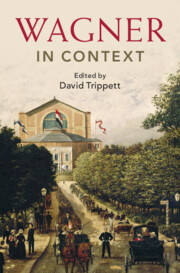Book contents
- Wagner in Context
- Composers in Context
- Wagner in Context
- Copyright page
- Contents
- Illustrations
- Musical Examples
- Contributors
- Acknowledgements
- Abbreviations
- Introduction
- I Place
- Chapter 1 Paris
- Chapter 2 Dresden
- Chapter 3 Zurich and Lucerne
- Chapter 4 Italy
- Chapter 5 London
- Chapter 6 Bayreuth as City: A Wagnerian Chronology
- Chapter 7 America
- Chapter 8 Spain in the Cosmos of Richard Wagner
- II People
- III Politics, Ideas, and Bodies
- IV Life, Language, and the Ancient World
- V Music and Performance
- VI Reception
- Further Reading
- Select Bibliography
- Index
Chapter 5 - London
from I - Place
Published online by Cambridge University Press: 14 March 2024
- Wagner in Context
- Composers in Context
- Wagner in Context
- Copyright page
- Contents
- Illustrations
- Musical Examples
- Contributors
- Acknowledgements
- Abbreviations
- Introduction
- I Place
- Chapter 1 Paris
- Chapter 2 Dresden
- Chapter 3 Zurich and Lucerne
- Chapter 4 Italy
- Chapter 5 London
- Chapter 6 Bayreuth as City: A Wagnerian Chronology
- Chapter 7 America
- Chapter 8 Spain in the Cosmos of Richard Wagner
- II People
- III Politics, Ideas, and Bodies
- IV Life, Language, and the Ancient World
- V Music and Performance
- VI Reception
- Further Reading
- Select Bibliography
- Index
Summary
The first of Wagner’s visits to London, in 1839, failed to secure the hoped-for performance of his Rule Britannia overture. He was also unable to meet Sir Edward Bulwer-Lytton, on whose Rienzi novel he had designs.
The second visit, in 1855, was made to conduct eight concerts for the Philharmonic Society, but Wagner fell foul of the conservative nature of the society’s programming, of old-fashioned performing practices in the country, and of the more reactionary members of the London press.
The third visit, in 1877, was intended to defray the deficit of the inaugural Bayreuth Festival with a series of concerts in the Royal Albert Hall. Economically the project misfired, but it sparked interest in his work among leading musicians, artists and intellectuals. It also helped pave the way for the surge of Wagnerism that would grip the arts in England at the close of the nineteenth century and into the twentieth.
Keywords
- Type
- Chapter
- Information
- Wagner in Context , pp. 49 - 57Publisher: Cambridge University PressPrint publication year: 2024

